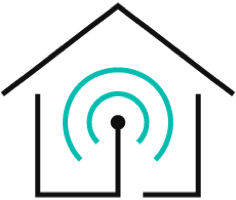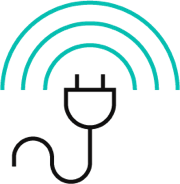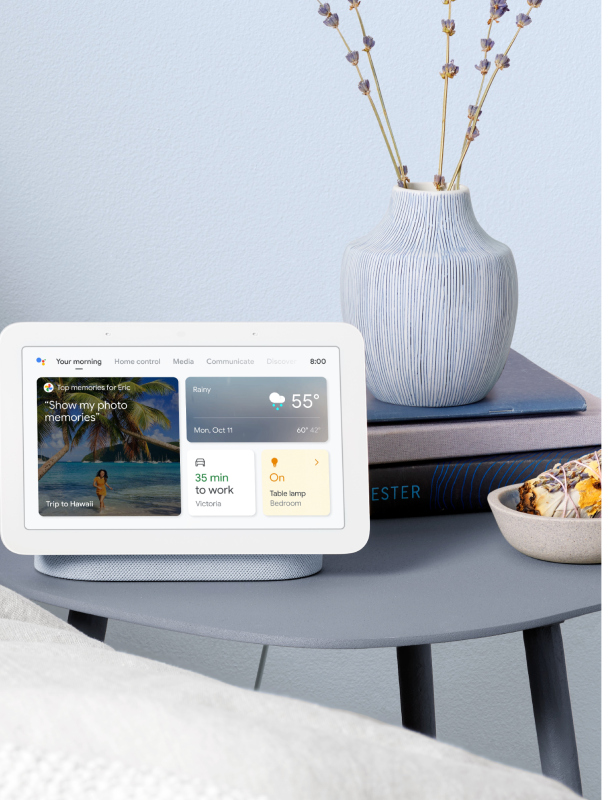Imagine waking up to a voice that updates you on the weather, displays your schedule, and offers step-by-step recipes. Smart displays like the Google Nest Hub and Google Nest Hub Max make this possible. But which one suits your lifestyle?
Today, we'll compare the features of both devices, including display quality, audio performance, video calling, and smart home integration. By the end, you'll have a clear idea about the nest hub vs nest hub max debate and which smart display is perfect for enhancing your home automation experience.
- What is Smart Hub?
- What is a Nest Hub?
- Nest Hub Vs Nest Hub Max : Difference, Advantages And Disadvantages
- Introducing the EVVR Center Lite: Redefining Home Automation
- Energy Monitoring Smart Plug Compatible with Your Smart Home Hub
What is Smart Hub?
A Smart Hub refers to a central device or platform that serves as a control center for various smart home devices and appliances. It acts as a bridge or intermediary between different devices, allowing them to communicate and interact with each other.
Smart Hubs are typically equipped with wireless connectivity options such as Wi-Fi, Bluetooth, Zigbee, or Z-Wave, which enable them to connect with a wide range of smart devices, including lights, thermostats, door locks, security cameras, and more.
The key functions of a Smart Hub include:
Device Control
Smart Hubs allow users to control and manage connected devices from a single point of control. This includes turning devices on or off, adjusting settings, and creating automation routines. For instance, with a smart hub, you can use a mobile app or voice commands to turn on/off lights, adjust the thermostat, lock/unlock doors, or control other connected devices in your home.
Automation and Scenes
Users can create customized automation rules and scenes that trigger specific actions or behaviors across multiple devices simultaneously. For example, a "Good Morning" scene could turn on the lights, raise the thermostat, and start brewing coffee, all with a single command or scheduled activation.
Interconnectivity
Smart Hubs facilitate communication and interoperability between different smart devices that may operate on different protocols. They act as a universal translator, allowing devices to understand and work with each other seamlessly.
Remote Access
Many Smart Hubs provide remote access capabilities, enabling users to control and monitor their smart home devices even when they are away from home. This is typically achieved through cloud-based services that securely connect the hub and the user's mobile device or computer.
If you're away from home, you can use a smartphone app linked to your smart hub to remotely unlock the door for a visitor, check security camera feeds, or turn off appliances you forgot to switch off.
Data Aggregation and Analytics
Smart Hubs can collect data from various devices and generate insights or analytics regarding energy usage, security events, and other relevant information. This helps users make informed decisions and optimize their smart home systems.
Smart Hubs come in different forms, ranging from dedicated hardware devices to software-based platforms. Some popular examples of Smart Hubs include Amazon Echo Plus, Google Nest Hub, Samsung SmartThings, and Apple HomePod.
What is a Nest Hub?
A Nest Hub, now officially known as Google Nest Hub, is a smart display device developed by Google. It is part of the Google Nest product line, which includes a variety of smart home devices.
Here are some of the features of Nest Hub that you may find interesting:

Voice Control
The Nest Hub is equipped with far-field microphones that can pick up voice commands from across the room. Users can interact with the device by using the wake word "Hey Google" followed by their request or question.
Display and Visual Feedback
The device features a vibrant screen that provides visual feedback in response to queries, displaying information such as weather updates, calendar events, recipe instructions, and more. It can also show images, videos, and even act as a digital photo frame when not in use.
Smart Home Control
The Nest Hub serves as a central control center for managing various smart home devices. Users can control compatible devices like lights, thermostats, cameras, and door locks through the Nest Hub's interface or via voice commands.
Multimedia Entertainment
The device supports streaming services such as YouTube, Netflix, and Spotify, allowing users to watch videos or listen to music directly on the display. It can also be used for video calls using Google Duo.
Personal Assistant Functions
The Nest Hub can provide personalized information based on user preferences, such as commute updates, news briefings, and personalized recommendations. It can also set timers, reminders, and alarms.
Integration with Google Services
The Nest Hub seamlessly integrates with various Google services, including Google Calendar, Google Photos, Google Maps, and more. This integration enables users to access and interact with their personal data and services through the device.
It's important to note that there are multiple generations of the Nest Hub, each with its own specifications and features. The primary difference between the versions is usually related to screen size, resolution, and audio capabilities.
Nest Hub Vs Nest Hub Max : Difference, Advantages And Disadvantages
Here's a table highlighting the key differences between the Google Nest Hub and the Google Nest Hub Max:
|
Specification |
Google Nest Hub (2nd gen) |
Google Nest Hub Max |
|
Price |
$99.99 |
$229.99 |
|
Dimensions |
7 inches (L) x 2.7 inches (W) x 4.7 inches (H) |
9.85 inches (L) x 3.99 inches (W) x 7.19 inches (H) |
|
Screen Size |
7 inches |
10 inches |
|
AI Assistant |
Google Assistant |
Google Assistant |
|
Processor |
Quad-core 64-bit 1.9 GHz ARM CPU with ML hardware engine |
AMLogic S905D2, Quad-core 64-bit 1.9 GHz ARM CPU |
|
Audio |
Full-range speaker with a 43.5 mm driver |
Stereo speaker system with two 18mm, 10W tweeters and a 75mm, 30W subwoofer |
|
Camera |
No camera |
Built-in 6.5MP Nest camera |
|
Connectivity |
Bluetooth, WiFi (2.4 GHz/5 GHz), Chromecast |
Bluetooth, WiFi (2.4 GHz/5 GHz), Chromecast |
|
Design |
Floating screen with white bezels |
Floating screen with white bezels |
|
Interface |
Same interface |
Same interface |
|
Main Features |
● Smart home control ● Built-in Chromecast support ● Google Assistant ● Digital photo frame ● YouTube, Netflix, and Disney+ support |
● Smart home control ● Built-in Chromecast support ● Google Assistant ● Digital photo frame ● YouTube, Netflix, and Disney+ support ● Duo audio and video calls ● Gestures ● Face Match ● Security camera (Nest camera) |
These are some of the notable differences between the two devices. The Nest Hub Max offers a larger display, higher resolution, and stereo speakers with better audio quality. It also includes a built-in camera, allowing features like video calls and Face Match for personalized results. The Nest Hub, on the other hand, lacks a camera but still provides a compact and capable smart display experience.
Here are some advantages and disadvantages of both devices:
Advantages of Google Nest Hub
- Compact and space-saving design.
- Affordable compared to Nest Hub Max.
- Suitable for smaller spaces or where a smaller display is preferred.
- Provides a good smart home control center.
- Offers access to various streaming services.
- Supports voice commands and displays visual feedback.
- Integrates well with other Google services.
Disadvantages of Google Nest Hub
- Smaller display and lower resolution compared to Nest Hub Max.
- Lacks a built-in camera, limiting video call and Face Match capabilities.
- Audio quality may not be as robust as Nest Hub Max.
Advantages of Google Nest Hub Max
- Larger and higher-resolution display.
- Stereo speakers with better audio quality.
- Includes a built-in camera for video calls and Face Match feature.
- Provides a more immersive multimedia experience.
- Suitable for larger spaces or where a larger display is preferred.
Disadvantages of Google Nest Hub Max
- Priced higher compared to Nest Hub.
- Takes up more space due to its larger size.
- May not be necessary if video calls or Face Match features are not desired.
- Heavier and less portable compared to Nest Hub.
Introducing the EVVR Center Lite: Redefining Home Automation
While Google Nest does a pretty good job, if you still think you want something uniquely different to control your domestic operations effortlessly, we’d recommend you to check out our very own EVVR Center Lite.
Unveiling Simplicity: Bringing it all Together
EVVR Center Lite is the ultimate solution for simplifying your life and connecting your smart home devices effortlessly. Imagine coming home after a long day at work and with just a few taps on your smartphone, you activate your customized home automation system. The lights turn on, the temperature adjusts to your preferred setting, and your favorite playlist starts playing in the background. With EVVR Center Lite, you can easily create drivers for your Zigbee 3.0 and Z-Wave Plus devices, ensuring seamless integration and control. Plus, the local network capability allows your devices to communicate without relying on an internet connection, providing uninterrupted automation even during network outages. Experience the convenience, security, and future-proof compatibility of EVVR Center Lite in your smart home.
Unmatched Compatibility
The EVVR Center Lite is the real deal when it comes to compatibility. By November, it will be able to connect with your existing Google Home or Alexa devices. That means you can bring in all your favorite Google or Eccho gadgets and create a seamless smart home setup. No more juggling between different systems—just sit back, relax, and enjoy total control over your entire home like a boss.
Enhanced Connectivity: Z-Wave to WiFi
EVVR Center Lite supports a whole range of protocols—Zigbee, Z-Wave, BLE, Wi-Fi, you name it! It's like a party where all your devices can join in and jam together. Connect and control a variety of devices from different brands, and watch the magic happen as you orchestrate your home with effortless style.
Energy Monitoring Smart Plug Compatible with Your Smart Home Hub
EVVR has a range of smart home products that provide a complete and comfortable home experience.
EVVR Energy Monitoring Smart Plug and Relay HomeKit-enabled, can control your appliances on/off via HomeKit, EVVR App or the built-in button. This smart plug connects both older and newer home gadgets, and gives outdated appliances new and smart life and helps you monitor real-time power data and hourly energy consumption. It will also support Alexa and Google Assistant soon; you can choose our EVVR Smart Plug no matter what gateway you use.
Introducing the EVVR Energy Monitoring Smart Plug – currently crowdfunding with an exclusive invitation for you to explore its features. Limited-Time Pre-Sale Alert! Get smart with EVVR Smart Plug up to 35% off discounts!
Final Thoughts
Choosing the right smart home hub is a crucial decision when building a connected and convenient home environment. By considering factors such as compatibility, device support, control options, automation capabilities, security and privacy, scalability, user experience, support and updates, integration with other services, and budget, you can make an informed choice that suits your needs. A well-chosen smart home hub acts as the central command center, enabling seamless control, automation, and management of your smart devices. It brings convenience, efficiency, and customization to your daily routines, ultimately enhancing your smart home experience. So take the time to research and evaluate your options, and make a decision that will empower you to create a truly smart and interconnected home.
If you’re still not sure about which option would be better, feel free to leave us a message, and our expert support agents will give you a detailed guideline.















